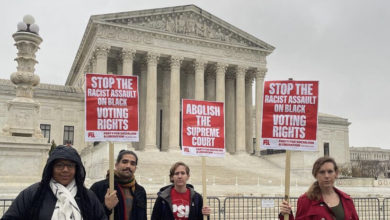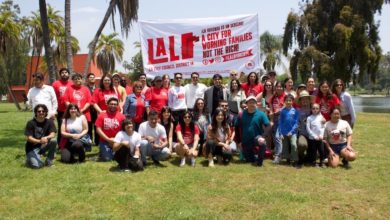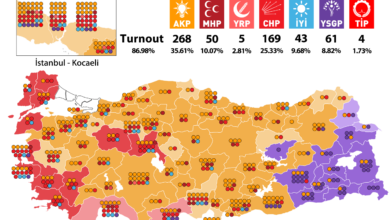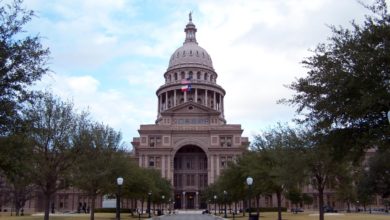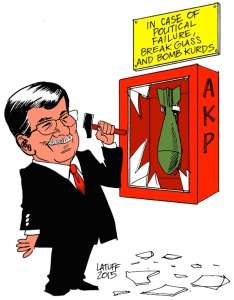 Following the general elections on November 1, the Justice and Development Party (AKP) led by President Tayyip Erdogan regained the parliamentary majority it had lost five months earlier in the June 2015 elections. The November 1 elections were held since a coalition government was not formed by the time of the August 28 deadline.
Following the general elections on November 1, the Justice and Development Party (AKP) led by President Tayyip Erdogan regained the parliamentary majority it had lost five months earlier in the June 2015 elections. The November 1 elections were held since a coalition government was not formed by the time of the August 28 deadline.
Increasing its votes by over 8 percent, AKP won over 49 percent, taking 317 seats of the 550-seat parliament. The Kemalist main opposition, the Republican People’s Party (CHP) retained its votes at 25.4 percent. With a loss of more than 4 percent, the fascist far-right Nationalist Movement Party (MHP) got close to 12 percent, losing more than half its seats. The Kurdish opposition, Peoples’ Democratic Party (HDP) barely cleared the 10 percent electoral threshold, close to 3 percent decline in its votes.
After AKP lost the elections in June, the period leading up to the new elections in November was marked with violence and repression with AKP targeting the Kurdish movement and progressive forces.
The opening of the violence was a bomb attack by the Islamic State (IS) in July in Suruç, close to the Syrian border, which killed 28 socialist Kurdish youth. It is worth opening a parenthesis to note that AKP has played a vital role in the rise of IS by providing it with arms, logistics, training and funds. The 500-mile long border with Syria has in the past served as a staging area for groups including the IS to launch attacks in Syria.
Following Suruç attack by IS, AKP announced that Turkey was joining the U.S.-led coalition in the so-called fight against IS and that Turkey would open up İncirlik air-base to the U.S.-led coalition the same day. This was a dirty quid-pro-quo deal struck between U.S. imperialism and AKP. As a result of this deal, U.S. imperialism gained the ability to use the strategically located Incirlik air-base which it had long sought after to accomplish its ultimate objective of overthrowing the Syrian government. As a result of the same deal, AKP got the tacit approval from the U.S. to attack the PKK in Northern Iraq and to repress Kurdish opposition on the domestic front with impunity. For more details, please read this previous article.
Under the vague and clichéd pretext of the “war on terror,” instead of fighting IS, AKP unleashed a wave of repression against the Kurdish movement. The police conducted hundreds of raids across Turkey, detained thousands and arrested hundreds. Airstrikes by the Turkish military hit Kurdistan Workers’ Party (PKK) positions in Northern Iraq, also killing civilians, unilaterally ending a cease-fire that had been in place between Turkey and PKK since 2013. As a result, PKK was forced to respond with a series of attacks against state security forces and military in the majority Kurdish southeast Turkey. That in turn gave AKP the further pretext to intensify violence against civilian population. Kurdish towns were put under curfew for weeks, some towns becoming targets of brutal military siege for days on end. Civilians were targeted and killed by security forces, houses were shelled by tanks and heavy artillery, resulting in large numbers of civilian deaths. For more details, please read this previous PSL statement.
An increasingly chauvinist and anti-Kurdish rhetoric by the President Erdogan, Prime Minister Davutoglu and other AKP officials accompanied the repression of the Kurdish people. They accused HDP of terrorism, alluding to its ties with PKK which is designated as a terrorist organization by the U.S. and Turkey. Encouraged and provoked by AKP officials, fascist gangs and lynch mobs took to the streets, targeting HDP offices and leftist organizations.
Three weeks before the election, on October 10, thousands attending a rally in Ankara to stand for peace and to denounce AKP’s war against the Kurdish people become the targets of a vile terror attack by the Islamic State. Over 100 people, some HDP and CHP members, were killed.
The violence against the Kurdish and leftist movements was in fact a deliberate strategy deployed by Erdogan and his AKP in order to regain single-party rule. By increasing repression against the Kurdish population, AKP hoped to consolidate support from its reactionary mass base while also gaining votes from the far-right MHP.
Given the new distribution of votes in November, it is easy to see that this strategy worked. On the one hand, AKP was able to grab enough nationalist votes from the MHP base as they responded to AKP’s repression of Kurdish. On the other hand, to the conservative Kurdish voters that had voted for HDP in June, AKP’s message was clear: If we lose the government in the November elections, there will be a return back to the “days of instability and terror.” It is important to remember that leading to the June elections, HDP had managed to bring together a broad coalition of groups within its ranks, from genuine revolutionary elements, pure Kurdish nationalists to reactionary political Islamists, the latter mostly swaying back to AKP.
Is AKP’s strategy of waging war against the Kurdish and the left the only reason behind its victory in the recent elections?
One can also say that the ambivalent positions by CHP or HDP towards AKP also played a role in AKP’s victory.
While denouncing AKP for its role in the rise of IS and the ongoing violence against the Kurdish people, neither party made any effort to expose the treacherous collaboration between AKP and U.S. imperialism and their overall role in the bloodbath in the region as part of the overall imperialist effort to overthrow the government of Syria.
Less than two weeks after the Ankara massacre that killed both HDP and CHP members, in an interview he gave on October 21, HDP co-chair Selahattin Demirtaş said that HDP would be open to any coalition following November 1, including one with AKP. Similar remarks were made by CHP officials. This helped AKP regain its lost legitimacy in the eyes of a large part of the population and whitewash its responsibility in the recent IS terror while also giving a signal to the masses that both parties had already accepted defeat even before the elections took place.
As far as the revolutionary left goes, almost all the left organizations decided to lend unconditional support to HDP, holding the position that defeating AKP in the elections was the most pressing issue. This position, with its myopic anti-Erdogan rhetoric in a vacuum that did not challenge the overall system, became completely irrelevant the moment HDP signaled the possibility of a coalition with AKP following the elections.
The Communist Party, Turkey (KP) was the only revolutionary party that participated in the elections with an electoral campaign that openly called for socialism as the only hope for solving the severe problems facing Turkey, including the oppression of Kurdish people. Before the elections, KP released a statement calling the people to strengthen the ranks of the party and to realize that a socialist revolution in Turkey is not only an urgent necessity but also possible. KP increased its votes more than five-fold in the elections. Commenting on this, the Secretary of the Central Committee of KP, Kemal Okuyan said: “The increase in the amount of our votes in a short time, is not significant at all for KP, however the following is significant: The belief that problems can be solved within the system has been dealt a major blow and it is obvious that there is a different type of quest by the people…and we will respond to this quest.
“Rather than the quantitative increase in our votes, we are more interested in the road that opened ahead of our position which we reached by arduous struggle. We’ll focus on that. Only then, those numbers in thousands and the changes mean something.”
Following the elections, AKP re-initiated the discussions for the plan to change the current Constitution which dictates that the president stay neutral and not engage in party politics. Both CHP and HDP stated that they were willing to negotiate with AKP on this issue. AKP is now hoping get a two-thirds’ support in the parliament, enough to change the Constitution to give Erdogan executive powers as president, essentially constitutionally legalizing his corrupt, brutal dictatorship.
Commenting on the election results and the earlier peace process that had previously been unilaterally abandoned by AKP, Osman Baydemir, an HDP deputy said:”It is now time for us to loudly and clearly demand peace from the government. Now that you have achieved what you wanted, after having spilled so much blood to achieve it, you (i.e. AKP) should return to the table for peace negotiations. Open the door for peace once again.”
Difficult days are ahead for all progressive people of Turkey, whether Kurdish or Turkish. Having regained the ability to dominate parliament and given the state of the opposition in parliament, AKP will surely tighten its dictatorial grip on the whole country and escalate its already brutal repression of all progressive and leftist movements.
Repression, however, breeds more resistance. As we celebrate the 98th anniversary of the glorious October Revolution, history reminds us that it is not in the rigged ballot boxes of the capitalists that people win or lose the fight for true equality, freedom and justice. Turkey’s case is no different. Only through resistance, determination, organization and under the leadership of a revolutionary party such as KP, it will be a socialist revolution by the working class of Turkey that scores the ultimate and true victory by defeating AKP, the bosses and the U.S. imperialism.


